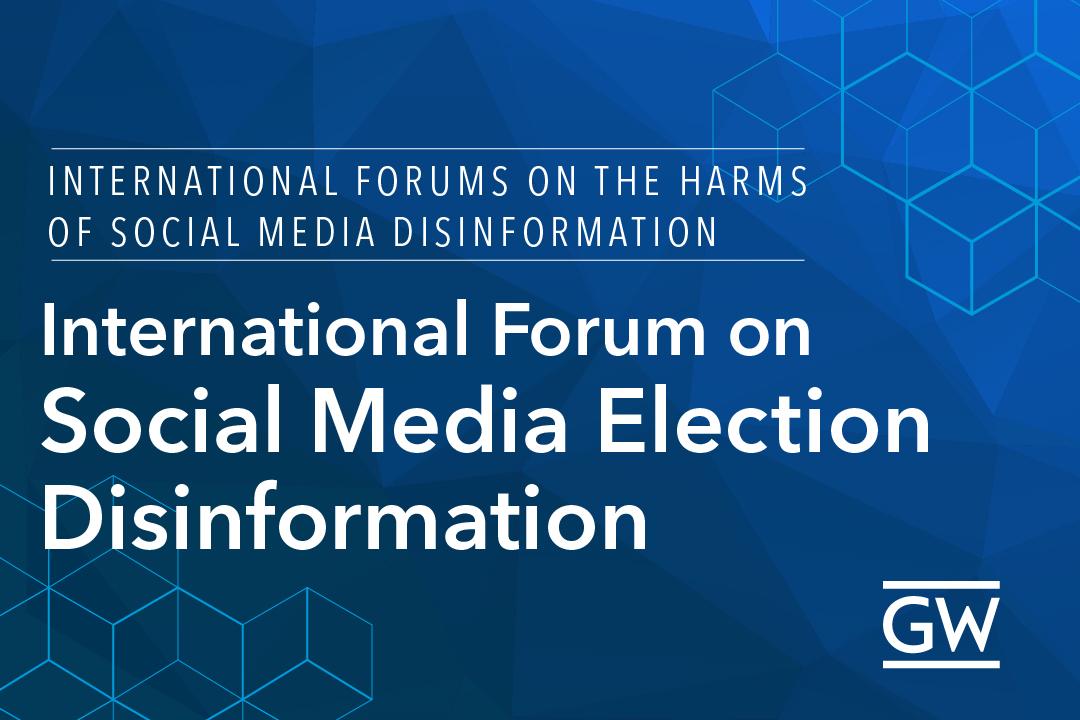Forum on Social Media Disinformation and Election Interference
As the 2020 election approaches, nothing is a bigger threat to our democracy than the prospect of illicit interference compromising the vote. Foreign and domestic election interference, disinformation, and voter suppression efforts proliferate on social media, and the platforms have utterly failed to address the threat.
The Institute for Data, Democracy & Politics hosted a forum featuring policymakers and other leaders from the U.S. and around the world and provided an opportunity for legislators and experts to discuss the consequences of digital platforms’ misinformation negligence on free and fair elections on Monday, June 29 at 10:00 a.m. EDT.
This forum featured U.S. and international lawmakers and leaders at the forefront of protecting the vote and democratic integrity. Witnesses fighting for ballot access and press freedom – and against racial disenfranchisement – outlined the gravity of the threat and where we go from here.
The GW event series was held in cooperation with the members of the International Grand Committee on Disinformation, a consortium of legislators working to protect consumers from social media disinformation.
Foreign and government interference panel:
- Rep. Adam Schiff, chairman, U.S. House Permanent Select Committee on Intelligence
- Dominic LeBlanc, member of Parliament, Canada
- Marina Kaljurand, member (Estonia), European Parliament
- Maria Ressa, CEO and executive editor, Rappler
- Sasha Havlicek, CEO, Institute for Strategic Dialogue (ISD)
Transition remarks:
- Stacey Abrams, founder, Fair Fight; former Democratic leader, Georgia House of Representatives
Voter suppression and democratic integrity panel:
- Sen. Mazie K. Hirono, member, U.S. Senate Committee on the Judiciary
- Phumzile van Damme, member of Parliament, Republic of South Africa
- Jocelyn Benson, Michigan secretary of state
- Kailee Scales, managing director, Black Lives Matter Global Network
- Hector Sanchez Barba, executive director and CEO, Mi Familia Vota
Moderator:
- Frank Sesno, director, GW School of Media and Public Affairs
Event collateral:
- Panelist bios can be found here.
- Tech Transparency Project Election Interference report can be found here.
Further reading on election interfernce:
- Russian social media accounts sow US election discord - again
- Social media manipulation as a political tool is spreading
- Facebook: Russian trolls are back. And they're here to meddle with 2020
- ‘Chaos Is the Point’: Russian Hackers and Trolls Grow Stealthier in 2020
- US says Russia, China and Iran are trying to influence 2020 elections
- Russia Sought to Use Social Media to Influence E.U. Vote, Report Finds
- Russia and China target U.S. protests on social media
- Last Year, Social Media Was Used to Influence Elections in at Least 18 Countries
- Social Media is Now Prime Conduit for Foreign Interference
- Russian operation linked to former IRA associates employed social media users in Ghana to target black communities in the US
- Exposing Secondary Infektion
- Report on Russian disinformation, prepared for the Senate, shows the operation’s scale and sweep
Further reading on voter suppression:
- Voter Suppression and Racial Targeting: In Facebook’s and Twitter’s Words
- Manipulation Machines
- Social networks haven’t done enough to prevent voter manipulation, tech leaders say
- African American Voters Alert to Social Media Disinformation
- American voters worry they can’t spot misleading information, poll finds
- Why Facebook must do more to combat election interference
- Voter Suppression Has Gone Digital
- Social media 'crisis' as election manipulation hits peak levels worldwide
- Facebook Knows It Encourages Division. Top Executives Nixed Solutions
- Social media giants are failing to stop manipulation, NATO researchers find
-
Google Pushing Scam Ads on Americans Searching for How to Vote


